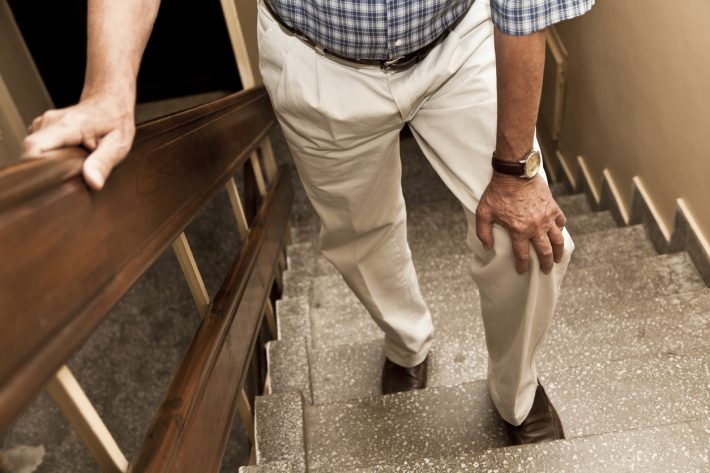CAN YOU GET WORKERS COMPENSATION FOR A DEGENERATIVE INJURY?
January 12, 2017
What happens when you have a bad back, dodgy knee or other injury and it’s made worse by your work? Can you get workers compensation? That was the situation for a butcher who suffered a left knee injury and then won the right to have his knee replacement surgery paid for by his employer. In this decision, there was disagreement between the parties about whether the injury had occurred as a result of a pre-existing condition (a degenerative injury) or whether it was a result of his employment.
Background
The man was a 61 year-old butcher for Coles supermarkets. He had been employed by Coles for 31 years. In December 2013 he injured his left knee and needed a total knee replacement. The man had played Aussie Rules football until the age of 27 and had been injured a number of times, but none of those injuries were to his knee. As a football umpire, he had later injured his right knee and needed an arthroscopy.
He had also injured his back a number of times between 1993 and 1997. He later suffered lower back pain and sciatica. He needed extended time off work to recover and then he returned to work on modified duties.
In 2009 and again in 2013, he suffered pain in his left knee. This may have been caused by his favouring one leg over the other in order to overcome his back pain and sciatica. It was successfully treated with pain killers. Then in 2013, Coles requested and he agreed to return to his butchering duties because a store was in need of a butcher. This was even though he was on permanent modified duties.
In 2013 there was a power cut and he needed to do a lot of heavy lifting to save meat from spoiling. Lots of bending and squatting was involved and there was a sharp cracking sound in his left knee, followed by pain. About 5 months later he was in so much pain that he could no longer work.
He had a further arthroscopy and was allowed to return to work on light duties. However, he didn’t have enough staff support for light duties and so ended up lifting heavy cartons and doing other manual work.
The man wanted Coles to fund the cost of the surgery but Coles refused, saying that his knee injury was degenerative and therefore not related to his employment. The man applied to the South Australian Employment Tribunal (Tribunal) to decide whether Coles should pay for the surgery.
Decision
The Tribunal said that in order to get workers compensation, the man had to prove that his employment had contributed to his injury. Experiencing symptoms of the injury whilst at work was not enough.
It found that even though the man had taken time off work because of his injury, he continued to work whenever possible, despite the pain. He had even agreed to return to butchering despite being on permanent alternative duties.
The Tribunal found that the heavy lifting following the 2013 power cut had caused his injury but it didn’t on its own cause the further deterioration of his knee.
But, it also said that the work that he was doing, particularly because it was outside the scope of his work restrictions, aggravated the degenerative condition in his knee. There was enough of a connection between the man’s employment and the injury for it to have contributed to his incapacity for work and the escalation of his symptoms.
The Tribunal found that the association between the man performing his normal duties, the worsening of his symptoms and the deterioration of his knee meant that he had a compensable secondary injury.
It said that although the damage to the knee was accelerated after surgery in 2014, the surgery itself could be considered part of his employment because (under the old laws which applied at the time) attendance at a place to receive a medical service formed part of his employment.
So despite the degeneration, the knee injury was a workers compensation claim and Coles was ordered to fund the cost of the man’s knee replacement.
What does it mean?
Sometimes, when a series of injuries occur, or when there is a recurrence of an existing injury, the lines become blurred about the extent of the employer’s responsibility. Coles could not successfully argue that the injury was degenerative because the man working outside the scope of his restrictions, performing work that was far too taxing on his body.
The man had also demonstrated his commitment to his employer by taking limited time off work and agreeing to be placed in work where there was a real need, despite his own limitations.
This meant that Coles couldn’t rely upon any arguments that his degenerative condition was the real culprit. The Tribunal was able to find that Coles needed to pay the man workers compensation for the cost of the surgery.
If you a concerned about how a degenerative condition may affect your ability to claim workers compensation, contact us today for a free first interview. We have a team of workers compensation specialists who can assist you, no matter what the issue.


